
We have previously written about lung cancer screening and the health benefit to those at high risk of lung cancer. The health benefit is early detection. There is no room for doubt when it comes to lung cancer – early detection saves lives.
Lung cancer screening, by low dose CT scan, is quick, painless and it helps your doctors find cancer early. In its early stages, lung cancer is often curable and treatment is almost always more effective.
Guidelines for lung cancer screening are established by the American Cancer Society (ACS) and the US Preventive Services Task Force (USPSTF), a group of independent medical experts that set separate screening criteria. Lung cancer screening guidelines are important because they influence treating doctors’ recommendations and affect insurance company decisions on when screening is covered under insurance plans.
For almost a decade, both the USPSTF and the ACS have recommended annual low dose CT scan lung cancer screening for individuals meeting these criteria:
- Age 50 to 80 years
- 30 pack-year smoking history (A pack year equals the number of packs smoked per day times the number of years smoked)
- Active smoker OR quit smoking within the past 15 years
Recently, the ACS has broadened its screening criteria. The new guidance will allow more people at risk for lung cancer to be screened. The new guidelines lower the total pack year requirement and enlarge the criteria to include all former smokers. The new guidelines recommend the following individuals be screened:
- Age 50 to 80 years
- 20 pack year smoking history
- Active smoker or previously smoked
Under these updated guidelines, the ACS estimates an additional 5 million active and former smokers will be eligible for lung cancer screening, resulting in the prevention of 21% more lung cancer deaths over the old recommendations. But cancer screening can only work when those eligible to be screened actually get screened. It is estimated only 10-15% of those eligible for cancer screening take advantage of the opportunity. Talk to your doctor about the new screening criteria and ask about the benefit cancer screening may have for you.
Railroad workers who have been exposed to asbestos and diesel exhaust are particularly at risk for lung cancer and screening takes on even more importance. That is why many large cancer centers include asbestos exposure in their assessments for cancer screening. If you are a railroad worker and have been diagnosed with lung cancer, please don’t hesitate to call Doran & Murphy today to discuss your rights.





